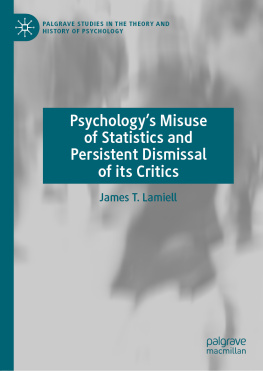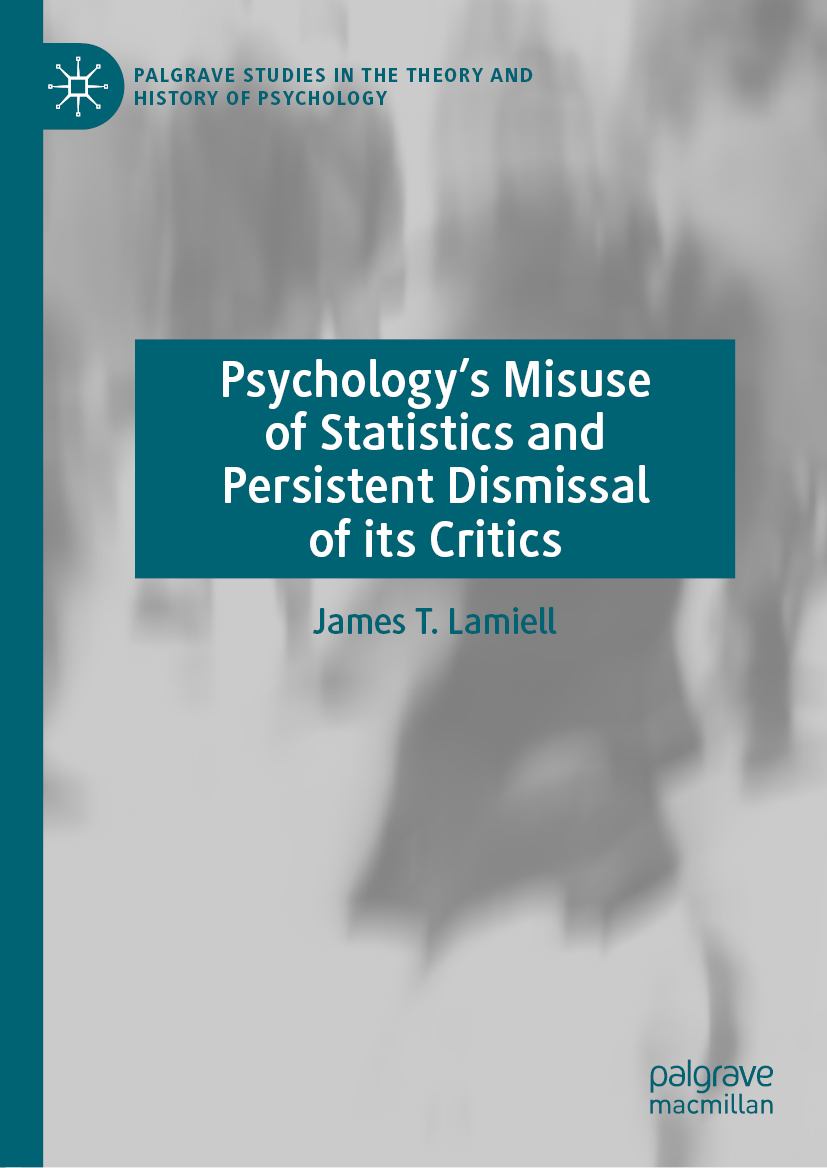Palgrave Studies in the Theory and History of Psychology
Series Editors
Jack Martin
Department of Psychology, Simon Fraser University, Burnaby, BC, Canada
Thomas Teo
Department of Psychology, York University, Toronto, ON, Canada
Palgrave Studies in the Theory and History of Psychology publishes scholarly books that use historical and theoretical methods to critically examine the historical development and contemporary status of psychological concepts, methods, research, theories, and interventions. The books in the series are characterised by an emphasis on the concrete particulars of psychologists scientific and professional practices, together with a critical examination of the assumptions that attend their use. These examinations are anchored in clear, accessible descriptions of what psychologists do and believe about their activities. All the books in the series share the general goal of advancing the scientific and professional practices of psychology and psychologists, even as they offer probing and detailed questioning and critical reconstructions of these practices.
Series Editorial Board
Alex Gillespie, London School of Economics and Political Science, UK
Suzanne R. Kirschner, College of the Holy Cross, USA
Annette Mlberger, Universitat Autonoma de Barcelona, Spain
Lisa Osbeck, University of West Georgia, USA
Peter Raggatt, James Cook University, Australia
Alexandra Rutherford, York University, Canada
More information about this series at http://www.palgrave.com/gp/series/14576
James T. Lamiell
Psychologys Misuse of Statistics and Persistent Dismissal of its Critics
James T. Lamiell
Georgetown University, Washington, DC, USA
Palgrave Studies in the Theory and History of Psychology
ISBN 978-3-030-12130-3 e-ISBN 978-3-030-12131-0
https://doi.org/10.1007/978-3-030-12131-0
Library of Congress Control Number: 2018968356
The Editor(s) (if applicable) and The Author(s), under exclusive license to Springer Nature Switzerland AG 2019
This work is subject to copyright. All rights are solely and exclusively licensed by the Publisher, whether the whole or part of the material is concerned, specifically the rights of translation, reprinting, reuse of illustrations, recitation, broadcasting, reproduction on microfilms or in any other physical way, and transmission or information storage and retrieval, electronic adaptation, computer software, or by similar or dissimilar methodology now known or hereafter developed.
The use of general descriptive names, registered names, trademarks, service marks, etc. in this publication does not imply, even in the absence of a specific statement, that such names are exempt from the relevant protective laws and regulations and therefore free for general use.
The publisher, the authors and the editors are safe to assume that the advice and information in this book are believed to be true and accurate at the date of publication. Neither the publisher nor the authors or the editors give a warranty, expressed or implied, with respect to the material contained herein or for any errors or omissions that may have been made. The publisher remains neutral with regard to jurisdictional claims in published maps and institutional affiliations.
This Palgrave Macmillan imprint is published by the registered company Springer Nature Switzerland AG
The registered company address is: Gewerbestrasse 11, 6330 Cham, Switzerland
This book is dedicated to those Georgetown University colleagues who, over my 36 years at that institution, nourished my efforts both by their encouragement and by their insightful critical appraisals of my work.
Foreword
Most major associations of psychologists have adopted some version of the scientistpractitioner model, first advanced by the American Psychological Association in Boulder, Colorado in 1949. This model proposed to train clinical, applied psychologists in research and scientific practice to ensure that they themselves and the psychological interventions they deliver are well grounded in psychological science. More recently, the APA 2005 Presidential Task Force on Evidence-Based Practice further integrated psychological science with professional psychological practice by insisting that effective psychological intervention must be based on the best available empirical research, defined as scientific results related to intervention strategies, assessment, clinical problems, and patient populations in laboratory and field settings as well as relevant results of basic research in psychology and related fields (2006, p. 274). Acknowledging the importance of multiple sources of scientific evidence, including the clinical expertise of applied psychologists, the Task Force concluded that systematic and broad empirical inquiryin the laboratory and in the clinicwill point the way toward best practice in integrating best evidence (p. 280). Of particular interest for readers of this book is a statement made by the task force in the penultimate paragraph of their report: The application of research evidence to a particular patient always involves probabilistic inferences (p. 280).
James Lamiell argues herein that psychological research that reports descriptive and inferential statistical analyses of aggregated data drawn from many individuals isnotrelevant to understanding individual persons or how any individual person might react to the variables and contexts of psychological research as reported and generalized. This is the case whether or not attempts to categorize, predict, or comprehend any particular individual are absolute or probabilistic. The aggregated data of psychological science, as typically practiced by psychological researchers, cannot be known to apply to any individual person. If Lamiell is correct and his argument valid, any claims by psychologists or their organizations to the contrary must be false and psychology should not be understood as a discipline that has anything scientifically authoritative to say about individuals. In arguing clearly, concisely, and coherently for these conclusions, Lamiell directly challenges the claims of organized psychology to knowledge that can help individual persons to achieve psychological well being. This is a bold, perhaps startling, project but one I think any psychologist or user of psychology should want to take seriously and try to understand.
What perhaps is even more startling, and possibly damning, is the revelation that Lamiell is not the first person to make such arguments. As a respected historian of psychology, as well as a theoretical and quantitative psychologist, Lamiell is well positioned to supply the historical background for his arguments. This makes for a fascinating read as he explains how the first formal psychological research conducted in Germany in the last decades of the nineteenth century made no use of aggregated data but carefully considered all responses of each and every individual who participated in that research. It was not until psychology took a firm foothold in the United States and applied Anglo-American methods of statistical analysis to aggregated data that problems in interpreting the results of such work began to arise. What the early German psychologists were after were results that were common to and true for















